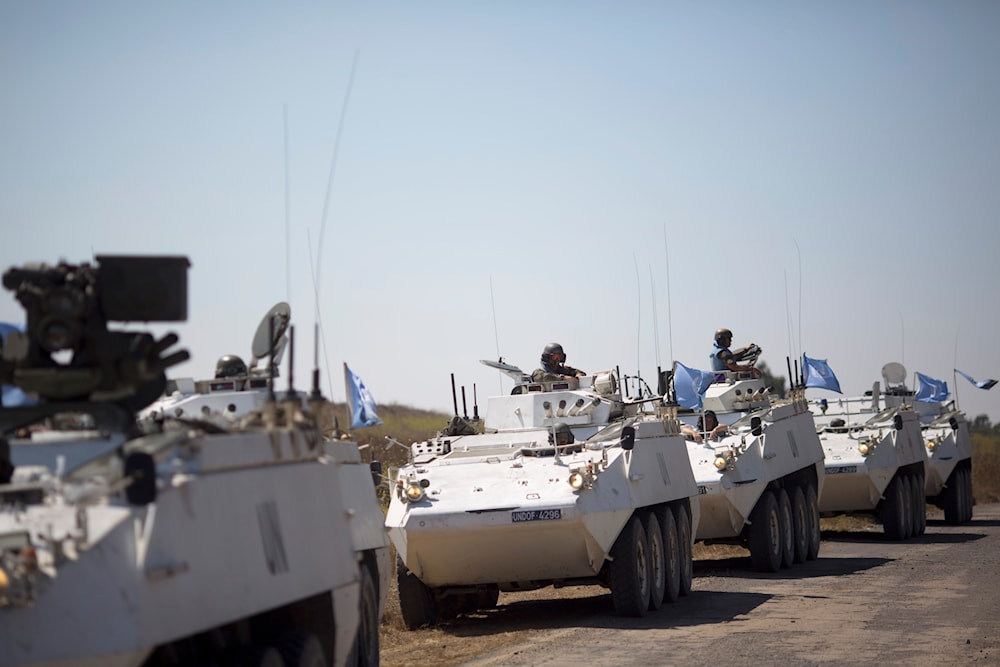UN Security Council extends Golan peacekeeping mandate
The UN Security Council has extended the UNDOF mandate on the occupied Golan Heights through December 2025.
-

Armored vehicles from the United Nations peacekeepers of the UN Disengagement Observer Force, also known as UNDOF wait to cross from the Israeli-occupied Golan Heights to Syria, on August 28, 2014. (AP)
The United Nations Security Council on Sunday unanimously adopted Resolution 2782, extending the mandate of the United Nations Disengagement Observer Force (UNDOF) on the occupied Syrian Golan Heights for another six months, through December 31, 2025.
The renewal comes amid growing concern over ceasefire violations in the area and simultaneous reports of backchannel normalization efforts between Damascus and the Israeli occupation, under the mediation of US President Donald Trump.
The resolution reaffirmed the council’s demand that both Syria and "Israel" fully respect the terms of the 1974 Disengagement Agreement, which established the UNDOF following the Yom Kippur War. It also called on both parties to “exercise maximum restraint” and avoid any breaches in the buffer zone, known formally as the area of separation.
It further requested UN Secretary-General António Guterres to ensure that the peacekeeping mission is adequately resourced and equipped to carry out its duties "in a safe and secure manner."
'Israel' breaches UN buffer zone
While the mandate’s extension passed without opposition, it comes at a time of mounting instability in southern Syria. The UN has documented repeated Israeli military incursions into the buffer zone, including ground deployments, aerial violations, and the obstruction of UNDOF patrols, particularly in the Quneitra region. The Israeli occupation's actions directly contravene the 1974 ceasefire terms that the resolution seeks to uphold.
UN peacekeeping officials have warned that these breaches not only endanger the fragile ceasefire but also severely limit UNDOF’s operational reach, reducing logistical missions and increasing security risks for peacekeepers.
The Israeli occupation has set up multiple bases in southern Syria, continuously patrolling the region. Israeli occupation forces have also conducted raids on Syrian towns and destroyed or seized Syrian military assets, as well as demolished civilian infrastructure. Additionally, multiple Syrians have been killed by direct gunfire or strikes conducted by Israeli aircraft, since the Syrian transitional President Ahmad al-Sharaa took power.
Read more: 'Israel' rejects Golan discussions in normalization talks with Syria
Trump-led diplomacy eyes normalization
The UN decision also comes as Rabbi Abraham Cooper, a senior American Jewish leader who recently met with al-Sharaa, claimed that a meeting between al-Sharaa and Israeli Prime Minister Benjamin Netanyahu is possible, if Trump facilitates it.
Cooper’s comments, widely reported in Israeli media, highlighted Syrian openness to cooperation on agriculture, water, and religious heritage, despite the continued Israeli occupation of the Golan Heights and repeated Israeli airstrikes on Syrian territory.
Read more: Preliminary US-backed talks underway between 'Israel', Syria: Axios

 3 Min Read
3 Min Read









